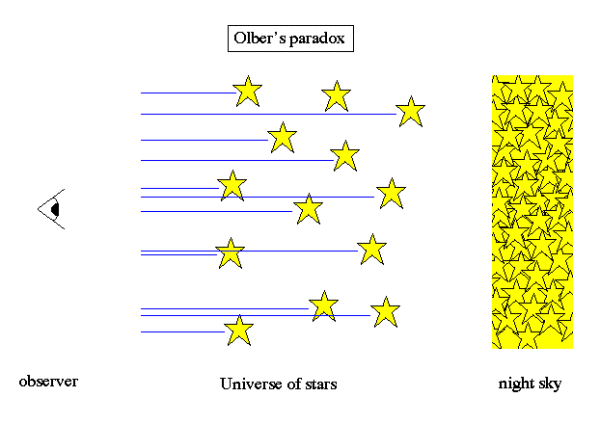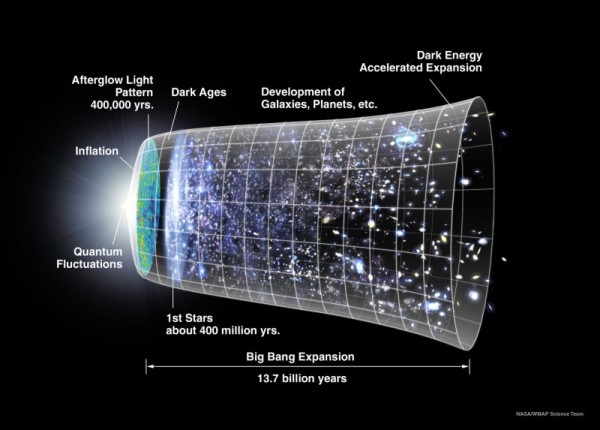"Were the succession of stars endless, then the background of the sky would present us a uniform luminosity, like that displayed by the Galaxy-since there could be absolutely no point, in all that background, at which would not exist a star." -Edgar Allan Poe
The master of the macabre, little known to most, was actually a very curious and astute armchair scholar of the cosmos. And when he looked out at the physical Universe, one of the most puzzling facts about it was the darkness of the night sky itself. Back in the 1820s, Heinrich Olbers put forth his famous paradox: that if the night sky was filled uniformly and infinitely with stars, eventually the human eye should encounter one in any and all directions.
 Image credit: James Schombert of the University of Oregon, via http://abyss.uoregon.edu/~js/ast123/lectures/lec15.html.
Image credit: James Schombert of the University of Oregon, via http://abyss.uoregon.edu/~js/ast123/lectures/lec15.html.
Yet the darkness of the night sky clearly showed this was not the case! In modern times, the Big Bang provides a solution to this by showing that there is a finite age to the Universe, and hence a time before which there were no stars. There is a leftover glow, but it's redshifted into the microwave region, visible as the CMB. And perhaps surprisingly, Poe -- writing in 1848 -- proposed a very Big Bang-like solution to Olbers' paradox!
Go take a look inside thanks to the historical research of Paul Halpern, and see what the literary genius anticipated, and missed, over on Starts With A Bang!
- Log in to post comments


Thanks. I never knew about this fascinating aspect of Poe. Some very good is highly speculative reasoning, which I woulda thunk required someone with mathematical training.
Of course with a universe infinite age and size , the sky wouldn't be bright like the MilkyWay, it would be bright like the disk of the Sun, and it would be impossible for a solid object like the earth to even exist! Of course we can look back far enough to find the entire sky shining...but its been redshifted so far that we call it the microwave background.
I first came across Olbers' paradox in an essay by Isaac Asimov in the magazine, "Fantasy and Science Fiction"
I now know that the explanation given is wrong! Even in an infinite, eternal universe, the radiation reaching earth would not be infinite, since different shells interfere with each other.
From Astronomy Online:
" 'Too little energy': Originally proposed by American cosmologist Edward Harrison in 1964. It was derived after computing the amount of energy required to create a bright sky, and finding out that it implies an overwhelming large number: the observable universe would need 10 trillion times more energy than it currently shows. This means that even if all matter in the universe were transformed into energy according to Einstein’s famous formula, the night sky would be barely brighter than it really is. This argument is truly one of the few heavy weight solutions to the riddle. "
Poe not only had some pretty remarkable speculations regarding the origin of the universe, but he was a pretty fair amateur sleuth, also. Acting like Nancy Drew, or the Hardy Boys, or Angela Lansbury in "Murder She Wrote", Poe solved an actual murder mystery by reading the papers. The story he wrote based on the actual murder was, "The Mystery of Marie Roget".
That's only why it isn't infinite in brightness. Not Olbers' paradox, which is that it is of the average intensity in every direction.
"That’s only why it isn’t infinite in brightness. Not Olbers’ paradox, which is that it is of the average intensity in every direction."
True, the universe DOES have a finite age, and it IS expanding, but in theory, Olbers paradox could be explained away if the distance between stars were large enough, the average intensity in each direction could be 3 K, or even higher, as long as it was low enough that we couldn't detect it solely with our vision.
"Olbers paradox could be explained away if the distance between stars were large enough, "
No, it could not. That can only work if the universe is finite in age or finite in extent or both.
That's the *point* of Olbers' paradox: you cannot have an infinitely old infinitely extended universe.
If you want to use expansion of the universe to solve it, then you're in a definitional problem: the universe is usually taken to mean the observed universe, not any unobservable one. You would have to say that you do not mean the observable universe first.
But Olber's paradox came well before expansion was noted, so is rather orthogonal to that proposition.
"Therefore, his prescient conclusion was an excellent example of the kind of proof by deduction a savvy detective would do — such as Poe’s famous fictional sleuth C. Auguste Dupin who employed deductive reasoning to solve mysteries."
No, that was induction, and it wasn't even close to a proof (which you only see in pure logic or mathematics). Please be careful with your terms.